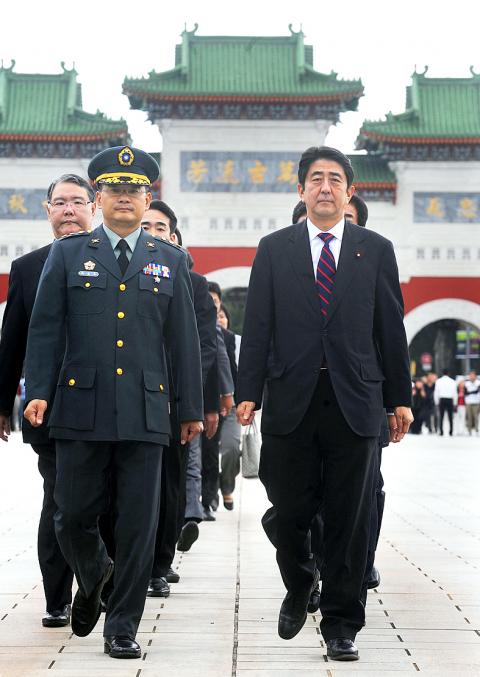President Ma Ying-jeou (馬英九) yesterday shunned issues relating to the contested Diaoyutai Islands (釣魚台) during his meeting with former Japanese prime minister Shinzo Abe.
Abe arrived in Taipei yesterday on the inaugural flight from Tokyo’s Haneda Airport to Taipei International Airport (Songshan). Eyes were on his meeting with Ma and whether they would touch on issues related to the island chain in the East China Sea claimed by China, Taiwan and Japan.
During a trip to the US earlier last month, Abe used a Nazi-era term to accuse China of pursing a modern-day policy of lebensraum with its growing assertiveness over disputed territories.

PHOTO: LIAO CHEN-HUEI, TAIPEI TIMES
Lebensraum, or “living space,” was a key tenet in the philosophy of Adolf Hitler who believed that Germany deserved space, especially in eastern Slavic areas, in which to grow.
Beijing and Tokyo have been embroiled in a bruising diplomatic row since early September, when Japanese authorities arrested the captain of a fishing trawler near the islets known as Diaoyutais in Taiwan and China and Senkaku in Japan. The Ma government said earlier this month that there was no need to object to China’s territorial claim to the -Diaoyutais since the -Republic of China (ROC) -Constitution states that China is still considered a territory of the ROC on Taiwan. This prompted concerns from Japanese officials over the political implications of this interpretation.
Ma avoided the contentious issue yesterday and instead focused on the resumption of direct flights between Taipei and Tokyo.
Describing Abe as “the ROC’s best friend,” Ma said Abe was the third generation of his family to have close ties with the ROC.
The resumption of flights between Songshan and Haneda was an important indication of improved Taiwan-Japan relations over the past two years, Ma said.
Aside from paying a visit to former president Lee Teng-hui (李登輝), Abe also visited the Martyrs’ Shrine (忠烈祠) where people who died in the state’s service are enshrined.
When asked by the press why he chose to pay a visit to the shrine, Abe said through a translator that people who sacrificed their lives for their country all deserved to be honored. When further pressed by the reporters whether he knew the shrine also honored anti-Japan martyrs, Abe did not answer as the accompanied translator did not translate the question.
Lee affirmed Abe’s shrine visit, saying it was a show of respect for the country.
ADDITIONAL REPORTING BY AFP AND STAFF
writer

CHAOS: Iranians took to the streets playing celebratory music after reports of Khamenei’s death on Saturday, while mourners also gathered in Tehran yesterday Iranian Supreme Leader Ayatollah Ali Khamenei was killed in a major attack on Iran launched by Israel and the US, throwing the future of the Islamic republic into doubt and raising the risk of regional instability. Iranian state television and the state-run IRNA news agency announced the 86-year-old’s death early yesterday. US President Donald Trump said it gave Iranians their “greatest chance” to “take back” their country. The announcements came after a joint US and Israeli aerial bombardment that targeted Iranian military and governmental sites. Trump said the “heavy and pinpoint bombing” would continue through the week or as long

TRUST: The KMT said it respected the US’ timing and considerations, and hoped it would continue to honor its commitments to helping Taiwan bolster its defenses and deterrence US President Donald Trump is delaying a multibillion-dollar arms sale to Taiwan to ensure his visit to Beijing is successful, a New York Times report said. The weapons sales package has stalled in the US Department of State, the report said, citing US officials it did not identify. The White House has told agencies not to push forward ahead of Trump’s meeting with Chinese President Xi Jinping (習近平), it said. The two last month held a phone call to discuss trade and geopolitical flashpoints ahead of the summit. Xi raised the Taiwan issue and urged the US to handle arms sales to

BIG SPENDERS: Foreign investors bought the most Taiwan equities since 2005, signaling confidence that an AI boom would continue to benefit chipmakers Taiwan Semiconductor Manufacturing Co’s (TSMC, 台積電) market capitalization swelled to US$2 trillion for the first time following a 4.25 percent rally in its American depositary receipts (ADR) overnight, putting the world’s biggest contract chipmaker sixth on the list of the world’s biggest companies by market capitalization, just behind Amazon.com Inc. The site CompaniesMarketcap.com ranked TSMC ahead of Saudi Aramco and Meta Platforms Inc. The Taiwanese company’s ADRs on Tuesday surged to US$385.75 on the New York Stock Exchange, as strong demand for artificial intelligence (AI) applications led to chip supply constraints and boost revenue growth to record-breaking levels. Each TSMC ADR represents

State-run CPC Corp, Taiwan (CPC, 台灣中油) yesterday said that it had confirmed on Saturday night with its liquefied natural gas (LNG) and crude oil suppliers that shipments are proceeding as scheduled and that domestic supplies remain unaffected. The CPC yesterday announced the gasoline and diesel prices will rise by NT$0.2 and NT$0.4 per liter, respectively, starting Monday, citing Middle East tensions and blizzards in the eastern United States. CPC also iterated it has been reducing the proportion of crude oil imports from the Middle East and diversifying its supply sources in the past few years in response to geopolitical risks, expanding